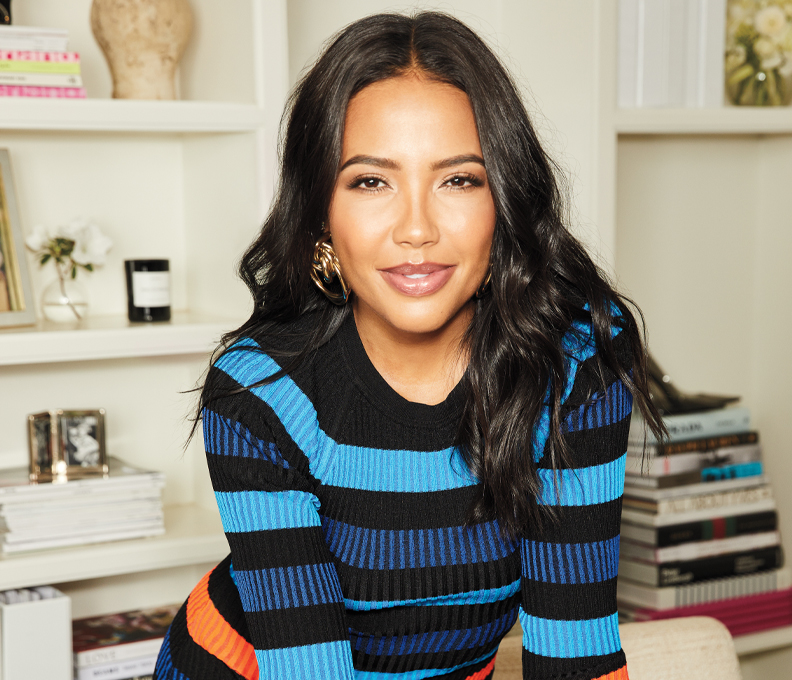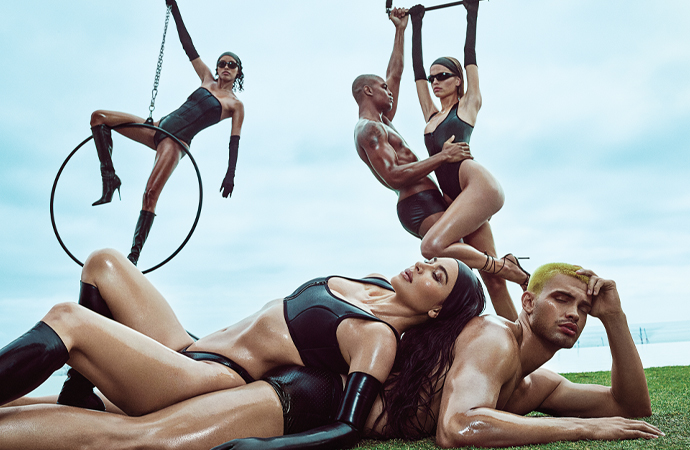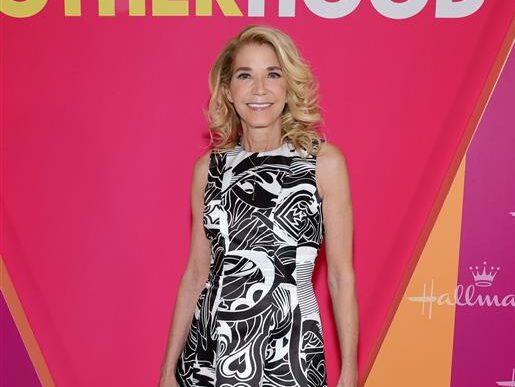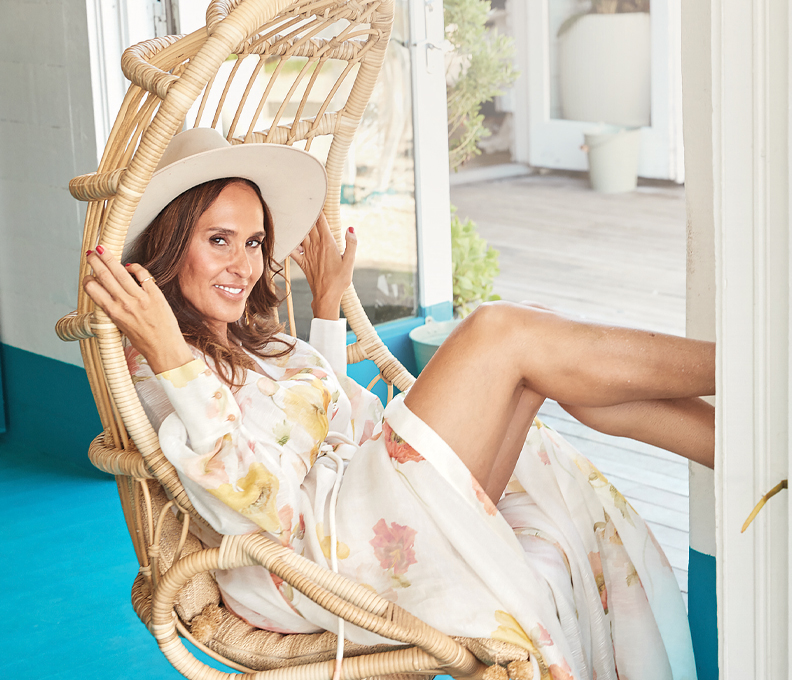Skims and Good American Cofounder Emma Grede: “Commitment to Diversity Is a Superpower”
With megabrands including Skims and Good American, London-born entrepreneur Emma Grede is driving vital conversations in style, diversity and philanthropy
August 1, 2023

Emma Grede / Photo: Courtesy of Jamie Girdler
In a world dominated by email communications, Emma Grede still prefers to pick up the phone. That’s not surprising to anyone who knows this London-born entrepreneur, who sees opportunity almost as quickly as she speaks in her rapid-fire style. And when she sets her sights on a goal, waiting for a “yes” via the Internet isn’t the option she favors, especially as she possesses a contact roster most A-listers would envy.
Since 2015, each one of Grede’s goals has focused on solving a problem. A fashion and talent management veteran, the 40-year-old Grede was among the first to spark a conversation about the massive disconnect between fashion-industry sizing and the flesh-and-blood women who craved high-end style beyond a size 12. The result: Good American, a denim website launched in October 2016. “In the early days of Good American, there was absolutely zero body diversity on any website, so I said, ‘We’re going to represent a curvy body, and we’re going to do it better than anyone else,’” Grede says. As proof of her concept’s success, Good American’s sales reached $1 million on its first day.
That feel-good story, however, was not without its challenges. Partnering with Khloé Kardashian, Grede embarked full force into every aspect of growing the business. “Had I not been so naive, I might have given up,” she admits. From schooling manufacturers on scaling fit properly in each size to hiring a staff that understood how to work with larger size ranges, Grede realized she had to build each element of a retail experience that never before existed—at least not to the level she envisioned it. “There were so many stumbling blocks,” she says. “Some retailers had never carried plus-size hangers, for example, so they didn’t know how clothes should hang or be displayed in larger sizes.”

Kim Kardashian featured in Steven Klein’s summer campaign for Skims / Photo: Courtesy of Matteo Prandoni/BFA
Good American’s incredible success in the denim category led to quick but thoughtful expansion to other product categories in subsequent seasons. Today the site carries everything from dresses and jumpsuits to swimwear, bodysuits, blazers and more, in sizes 00 to 32 Plus or XS to 5XL. Notably, unlike many other retail experiences, the site’s models likewise reflect both diversity and size inclusivity, enabling the consumer to see how a style might look on a body type similar to her own. Whether you’re seeking boot-cut jeans or a body-hugging leopard-print dress, the site allows you to click on your preferred model size, and a wealth of choices appear. “If you’re a woman who comes onto our site and you’re looking at a pair of jeans on a woman who’s a size zero, how are you able to envision that on your own body?” Grede says. “About a year into our business, we made the decision to shoot every single style on every single size. It was incredibly expensive and time-consuming, but it was the right thing to do. And we quickly discovered that women are three times more likely to purchase when they see the clothing in their own size.”
Other retailers paid attention. Today Good American is sold not only on its site—and in a recently opened brick-and-mortar location at Century City mall in Los Angeles—but also at Nordstrom, Bloomingdale’s, Saks Fifth Avenue, Anthropologie, Dillard’s and others. “We single-handedly forced the industry to sit up and take notice,” Grede says. “A retailer would tell us that they didn’t think they could sell black vinyl skinny pants in a size 24, and my response was, ‘How do you know until you try?’ Early on I decided to buy everything equally to understand demand for product, and we quickly realized that plus-size women were so underserviced. Maybe she could find basics, but that lace-up tiny bikini that’s of the moment? Impossible for her to find—until we made it for her and every other woman who visits our site.”
Yet even as Good American could have been the sole full-time business that Grede and her team continued to nurture and expand, other concepts became too irresistible. In 2019 she and her husband, Swedish entrepreneur Jens Grede, partnered with Kim Kardashian as the cofounders of Skims, initially launched as a shapewear brand that embraced a wide range of sizes and skin tones. “Kim had a very clear idea,” Grede says. “She knew exactly what she wanted, and she had worked with me in the past, while also knowing the relationship I had with Khloé. She decided to come to me and my husband, and we joined forces and haven’t looked back.” That may be a characteristic understatement: Skims has since expanded to include underwear, bras, swimwear and loungewear, and in 2022 the company was valued at $3.2 billion. At the CFDA Awards later that year, the Council of Fashion Designers of America awarded the Gredes and Kardashian with its inaugural Innovation Award.

Kardashian and Jens and Emma Grede accepting the inaugural Innovation Award for Skims from the Council of Fashion Designers of America / Photo: Courtesy of Steven Klein
Grede eagerly embraced her role at Skims early on, she says. “It’s Kim’s vision, her idea and execution, while I am chief product officer. I love product innovation, and I love working with fabric and figuring out new ideas. This suits me supremely well. So it really has been a dream come true—and if I’m being honest, I’m proud to be part of what’s become a juggernaut.”
With both Good American and Skims rooted in e-commerce, neither business experienced a major impact when the pandemic caused a global lockdown in March 2020. Meanwhile, as a mother of four, Grede had recently experienced her own epiphany of banishing all harsh chemicals and cleaning products in single-use plastic bottles from her home. “And then Covid came along, and I was like, Someone give me the bleach,” she recalls. Another business idea quickly came into focus: cleaning products crafted of plant-based, cruelty-free ingredients that worked exceptionally well and were housed in sustainable, refillable packaging.
That company, Safely, launched in March 2021, this time with Kris Jenner at Grede’s side. “No one has a cleaner home than Kris Jenner, and she knows about elevated products,” Grede says. “That doesn’t mean it had to be expensive. I wanted it to be affordable and available to most American families, because everyone wants to make better, safer choices.” Safely’s comprehensive selection ranges from dish and hand soap to laundry detergent, a universal surface cleaner, plug-in scent diffusers and more, all designed using natural ingredients and offering upscale, luxurious scents such as Calm, with notes that include lavender, coconut milk and lemon, or Rise, infused with notes of orange flower and jasmine. In addition to its own site, Safely is sold at retailers including Amazon, Walmart and Target.

With Kris Jenner, with whom she cofounded the cleaning products brand Safely / Photo: Courtesy of @PIERRESNAPS
Of course, Grede is often asked about her celebrated partnerships in this trio of businesses. “My relationship with the family goes back 10 years, and I always chuckle when people assume that their only involvement is via their social media channels,” she says. “My everyday with them is as hands-on business partners. Kim tries on every single thing for Skims, while Khloé is intrinsically linked, as well. And at the end of the day, business comes down to product. All the Instagram followers and all the media in the world cannot make customers buy a bad product. If you’re selling jeans for $169 or a bra for $59, that has to be a quality item. Kim and Khloé and Kris can be great accelerators of those products, but we’re about creating brands and products that speak for themselves.”
In May 2020, Grede found another reason to pick up the phone. That year, a wave of Black activism had resulted from the February murder of Ahmaud Arbery in Georgia, the fatal shooting by police of Breonna Taylor in March in Louisville, Kentucky, and the murder of George Floyd by police in Minneapolis 10 weeks later. “After George Floyd’s murder, I just found myself very purposefully thinking, What can I do?” Grede says, noting that her decade of philanthropic work included serving on the board of Baby2Baby, a Los Angeles-based nonprofit that provides diapers, clothing and other necessities to children living in poverty. “I am really good at activating and gathering parts of my network, so I set about finding a way to put that to good use.”
Grede soon found herself scrolling through the Instagram page of Aurora James, the New York-based accessories designer who was calling on leading retailers to commit to Black-owned fashion businesses via a project dubbed the Fifteen Percent Pledge, in which stores were asked to dedicate 15 percent of their space to Black-owned brands. (The designated figure is equal to the percentage of Black Americans in the U.S. population, according to the Census Bureau.)
“I just did what I do, thinking, I need to get to this girl,” Grede remembers. “Aurora and I sat on the phone for hours and hours. I understood the mission and the purpose and what she was trying to do. She was calling out a lot of companies on her Instagram, and I just started thinking, I can bring this person or that person to the table.” Grede’s first call was to Pete Nordstrom, president and chief brand officer of the Seattle-based department store, who was quickly on board. With James as founder, Grede became chairwoman of the Fifteen Percent Pledge. Nordstrom was soon joined by Sephora, Macy’s, Ulta Beauty, Rent the Runway and other retailers, with an estimated $14 billion shifted to Black-owned brands.
How to keep driving that engagement is another matter. “To say that energy wanes is an understatement,” Grede acknowledges. “It feels relevant to businesses and brands when it’s in your face, but what happens when everyone is focused on a different cause or crisis? Here’s what I tell business owners: Just because something doesn’t affect you directly doesn’t mean it doesn’t affect your employees. Brands that do well are able to think about both their employees and their customers.”
Ultimately, if your phone rings and Emma Grede is on the line, it’s a sure bet she’s eager to talk about a good idea, one rooted in making the consumer experience, and perhaps the community as well, just a little better. “I believe commitment to diversity is a superpower,” she says. “And my attitude is always: Let’s not wait, let’s just do it.”




